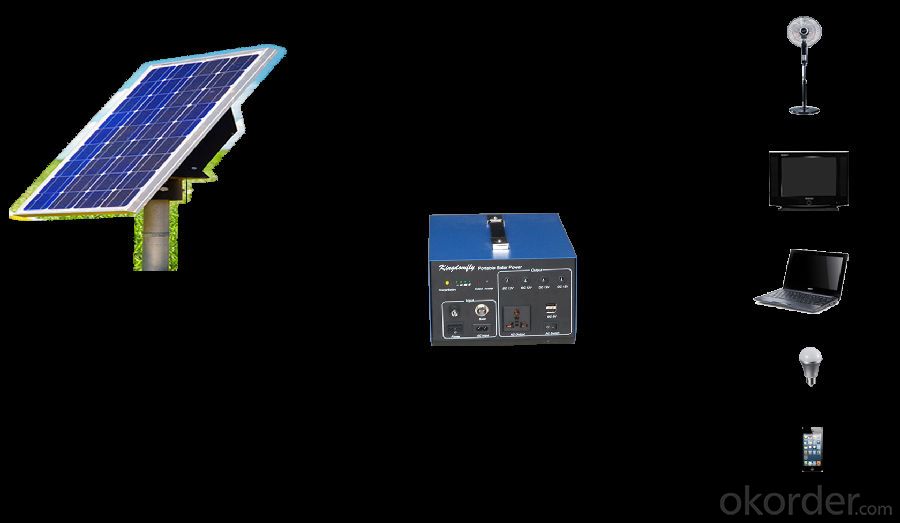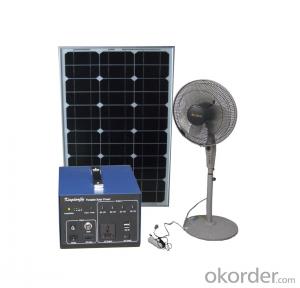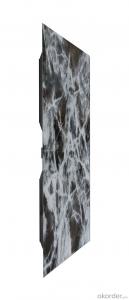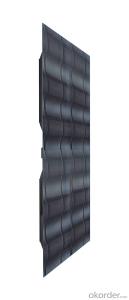Portable Solar Lighting System Hot Selling SPS_50W
- Loading Port:
- China main port
- Payment Terms:
- TT OR LC
- Min Order Qty:
- 3 pc
- Supply Capability:
- 10000 pc/month
OKorder Service Pledge
OKorder Financial Service
You Might Also Like
Main Information
SPS_50W This product is high performance,family used portable solar power system,which can receive energy and store it in battery outside connected to SPK by solar energy on sunny day,and supplies electric power for varies appliances such as electric fan,lighting lamps, television, portable computer etc.It can supply power for both DC and AC electric application .It’s very helpful and useful for home electric supply.

Features
◆ Both Solar charge input and AC charge input.
◆ Both DC and AC output
◆ Solar Feedback Circuit Protection
◆ Output Short-circuit Protection
◆ Solar「+」「-」anti-access protection
◆ Output「+」「-」anti-access protection
◆ Over Charged Protection
◆ Over Discharged Protection
◆ Over Load Protection
◆ Over-Temperature Protection
Technical parameters
Specification | Value/Material | |
Item No. KDF | SPS_50W | |
Solar Recommended | Specification | Poly silicon |
Working Voltage/Power | 18V45~60WP | |
Battery | Rated Voltage/Capacity | 12V26AH |
Cycle Number | 80% Deep Cycle Number:500 70% Cycle Number:800 | |
Working Temperature | Short Period(one Month):-20~50℃ Long Period(Six Months):-10~45℃ | |
Charging Controller | Operating Voltage | 12V |
Input Voltage | 17.3V~21V | |
Input current | MAX:10A | |
Power Consumption | MAX: 5mA | |
Low Voltage Disconnect(LVD) | 10.8V | |
Low Voltage Reconnect(LVR) | 12.3V | |
High Voltage Discharge( HVC) | 14.6V | |
High Voltage Recharge(HVR) | 13.8V | |
Temperature Protection | 60℃ | |
DC Output | DC output & Application | USB 5V1A*2 |
DC output & Application | DC 12V1*4A | |
AC Output | Output Wave | Modified Wave |
Input Voltage | 11V~15V | |
Output Voltage | 110V±10% | |
Output Frequency | 60Hz±2Hz/50Hz±2Hz | |
Rated Output Power | 200W | |
Maximum VA | 400VA | |
Maximum Efficiency | 88% | |
Temperature | 0-40℃ | |
Over Temperature | 60℃~70℃ | |
Low Voltage Alarm | 11V | |
Low Voltage Shut off | 10.5V | |
High Voltage Shut off | 16V | |
Package | Set size | 328*252*267mm |
Set N·W | 11.6kg | |
Set N·W | 12.8kg | |
- Q:Can solar energy systems be installed on floating structures?
- Yes, solar energy systems can be installed on floating structures. Floating solar panels, also known as floating photovoltaic (FPV) systems, are becoming increasingly popular as a sustainable solution for harnessing solar energy. These systems can be installed on various floating structures like reservoirs, lakes, and even oceans. They offer several advantages such as increased energy production due to the cooling effect of water, reduced land use, and the potential to utilize underutilized water bodies for renewable energy generation.
- Q:Can solar energy systems be used for powering off-grid eco-hospitals?
- Yes, solar energy systems can definitely be used for powering off-grid eco-hospitals. With advancements in solar technology, it is now possible to generate a sufficient amount of electricity from solar panels to meet the energy demands of a hospital. This renewable energy source can provide a reliable and sustainable power supply, reducing the dependency on fossil fuels and minimizing the environmental impact. Additionally, the off-grid nature of solar energy systems makes them ideal for remote locations where eco-hospitals are often situated, ensuring access to healthcare facilities in areas with limited or no access to the main power grid.
- Q:How do solar energy systems affect the electrical grid?
- Solar energy systems can have both positive and negative effects on the electrical grid. On one hand, they contribute to a more decentralized and sustainable energy system by generating clean electricity locally. This reduces the need for long-distance transmission lines and decreases transmission losses. On the other hand, the intermittent nature of solar power can create challenges for grid operators in maintaining a stable supply-demand balance. However, with proper grid integration and smart technologies like energy storage, solar energy systems can help enhance grid reliability and resilience.
- Q:What is the lifespan of solar panels used in solar energy systems?
- The lifespan of solar panels used in solar energy systems typically ranges from 25 to 30 years.
- Q:How do solar energy systems impact national energy policy?
- Solar energy systems have a significant impact on national energy policy by promoting a shift towards renewable energy sources and reducing dependence on fossil fuels. They encourage the adoption of sustainable practices and help countries meet their carbon emission reduction targets. Additionally, solar energy systems foster energy independence, create new job opportunities, and enhance energy security, ultimately shaping and influencing national energy policies.
- Q:Can solar energy systems be used for powering electric vehicle solar charging stations at rest areas?
- Yes, solar energy systems can be used for powering electric vehicle solar charging stations at rest areas. Solar panels can be installed at rest areas to capture sunlight and convert it into electricity. This electricity can then be used to power the charging stations, allowing electric vehicles to charge their batteries using clean and renewable energy. Solar charging stations provide an excellent opportunity to utilize solar energy in an efficient and sustainable manner, reducing the reliance on fossil fuels and lowering carbon emissions. Additionally, solar charging stations can be integrated with energy storage systems, such as batteries, to store excess electricity generated during the day for use during the night or on cloudy days. This ensures continuous availability of charging services, even when the sun is not shining. Overall, utilizing solar energy systems for powering electric vehicle charging stations at rest areas is an environmentally friendly and economically viable solution.
- Q:Can solar energy systems be used for water heating in swimming pools?
- Yes, solar energy systems can definitely be used for water heating in swimming pools. Solar panels can be installed to capture sunlight and convert it into thermal energy, which can then be used to heat the pool water. This method is not only environmentally friendly and cost-effective, but also allows for longer swimming seasons by maintaining a comfortable water temperature.
- Q:Can solar energy systems be used for powering electric vehicle research and development centers?
- Electric vehicle research and development centers can utilize solar energy systems for power. Solar energy, being a renewable and clean source, contributes to reducing the carbon footprint of these centers. The installation of solar panels on the rooftops or in open spaces allows the centers to harness solar energy and convert it into electricity for various operations. This approach not only provides sustainable energy but also lessens reliance on conventional electricity and fossil fuels. Moreover, the use of solar energy leads to long-term cost savings, as the initial investment in solar panels can be offset by reduced electricity bills. In conclusion, solar energy systems are a feasible and environmentally friendly choice for powering electric vehicle research and development centers.
- Q:Can a solar energy system be installed on any type of roof?
- Yes, a solar energy system can be installed on any type of roof, including flat, sloped, or even curved roofs. However, the specific installation process and requirements may vary depending on the roof type and its structural integrity.
- Q:What are the main features of solar photovoltaic systems
- Compared with the commonly used thermal power generation system, the advantages of photovoltaic power generation:No danger of depletion; safe and reliable, no noise, no pollution, absolutely clean (pollution-free); not subject to geographical distribution of the resources, can take advantage of the building roof; for example, areas without electricity, and complex terrain area; no fuel consumption and the erection of transmission line can be on-site power supply high quality energy;; users emotionally receptive; the construction period is short, get energy to spend a short time.
1. Manufacturer Overview |
|
|---|---|
| Location | |
| Year Established | |
| Annual Output Value | |
| Main Markets | |
| Company Certifications | |
2. Manufacturer Certificates |
|
|---|---|
| a) Certification Name | |
| Range | |
| Reference | |
| Validity Period | |
3. Manufacturer Capability |
|
|---|---|
| a)Trade Capacity | |
| Nearest Port | |
| Export Percentage | |
| No.of Employees in Trade Department | |
| Language Spoken: | |
| b)Factory Information | |
| Factory Size: | |
| No. of Production Lines | |
| Contract Manufacturing | |
| Product Price Range | |
Send your message to us
Portable Solar Lighting System Hot Selling SPS_50W
- Loading Port:
- China main port
- Payment Terms:
- TT OR LC
- Min Order Qty:
- 3 pc
- Supply Capability:
- 10000 pc/month
OKorder Service Pledge
OKorder Financial Service
Similar products
New products
Hot products
Related keywords




























